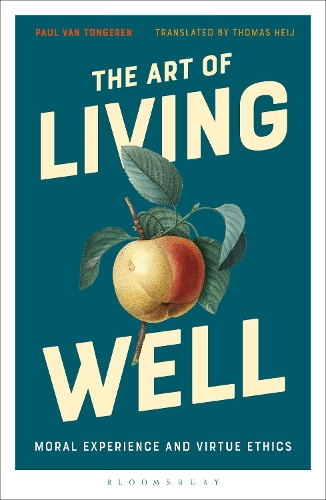
The Art of Living Well: Moral Experience and Virtue Ethics
(Paperback)
Available Formats
Publishing Details
The Art of Living Well: Moral Experience and Virtue Ethics
By (Author) Paul van Tongeren
Translated by Thomas Heij
Bloomsbury Publishing PLC
Bloomsbury Academic
23rd July 2020
United Kingdom
Classifications
Tertiary Education
Non Fiction
Social and political philosophy
Theology
171.3
Physical Properties
Paperback
200
Width 136mm, Height 214mm, Spine 16mm
267g
Description
In this first English translation of the prize-winning Dutch title Leven is Een Kunst, Paul van Tongeren creates a new kind of virtue ethics, one that centres on how to live well in our contemporary world. While virtue ethics is based on the moral philosophy of Aristotle, it has had many interpretations and iterations throughout history and features prominently in the thinking of the Stoics, Christian narratives and the writings of Nietzsche. The Art of Living Well explores and expands upon these traditions, using them as a basis to form a new interpretation; one that foregrounds art and creativity as paramount to the struggle to act in an authentic and moral way. Acting as both a clear introduction to virtue ethics and moral philosophy and a serious work of original philosophy, this book connects philosophy with real lived experience and tackles, head-on, the perennial philosophical question: how do we live well
Reviews
Ambitious in scope, clearly written, and accessible to both academics and laymen, Paul van Tongerens proposed hermeneutical ethics ventures to construct a modern virtue ethics for a secular world in tension with its own meaninglessness, while still respecting alternative ethical theories as interpretations of unique aspects of moral experience. * Matthew Valentine, Instructor in Philosophy, Duquesne University, USA *
Human relations and the will to practise ethics, as opposed to merely theorising about its foundations, are the main focus of this work that enables us to transform our life in such a way as to consider it the privileged object of a special, refined, and philosophically oriented form of art. * Emidio Spinelli, Professor of the History of Ancient Philosophy, Universit di Roma La Sapienza, Italy *
Paul van Tongerens highly readable book not only updates MacIntyres After Virtue by putting it in dialogue with new and different thinkers, it also recalls its predecessors philosophical ambition and impressive breadth of reference. One of its key accomplishments is to bring together virtue ethics with philosophy as a way of life. Anglophone readers will particularly benefit from the authors attention to Dutch and German exponents of the ethics of self-cultivation. Students of Aristotle and Nietzsche will also find much here to think over. It deserves to be widely read, enjoyed, and debated. * Kurt Lampe, Senior Lecturer of Classics, University of Bristol, UK *
Author Bio
Paul van Tongeren is Professor of Moral Philosophy and Ethical Theory at Radboud University, Nijmegen, The Netherlands; Special Professor of Ethics at the Institute of Philosophy in Leuven, Belgium; and Associate Researcher at the University of Pretoria, South Africa Thomas Heij studied philosophy at the University of Groningen, The Netherlands, and works as editor at the Nexus Institute
